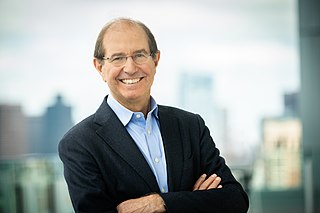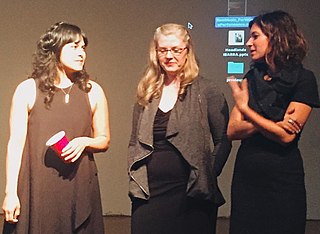
The University of California, San Diego is a public land-grant research university in San Diego, California. Established in 1960 near the pre-existing Scripps Institution of Oceanography, UC San Diego is the southernmost of the ten campuses of the University of California, and offers over 200 undergraduate and graduate degree programs, enrolling 31,842 undergraduate and 8,631 graduate students. The university occupies 2,178 acres (881 ha) near the coast of the Pacific Ocean, with the main campus resting on approximately 1,152 acres (466 ha). UC San Diego is ranked among the best universities in the world by major college and university rankings.

Silvio Micali is an Italian computer scientist, professor at the Massachusetts Institute of Technology and the founder of Algorand. Micali's research centers on cryptography and information security. In 2012, Micali received the Turing Award for his work in cryptography.
The Keck School of Medicine of the University of Southern California teaches and trains physicians, biomedical scientists and other healthcare professionals, conducts medical research, and treats patients. Founded in 1885, it is the second oldest medical school in California after the UCSF School of Medicine.

Lera Boroditsky is a cognitive scientist and professor in the fields of language and cognition. She is currently one of the main contributors to the theory of linguistic relativity. She is a Searle Scholar, a McDonnell Scholar, recipient of a National Science Foundation Career award, and an American Psychological Association Distinguished Scientist. She is Professor of Cognitive Science at UCSD. She previously served on the faculty at MIT and at Stanford.

Flossie Wong-Staal was a Chinese-American virologist and molecular biologist. She was the first scientist to clone HIV and determine the function of its genes, which was a major step in proving that HIV is the cause of AIDS. From 1990 to 2002, she held the Florence Riford Chair in AIDS Research at the University of California, San Diego (UCSD). She was co-founder and, after retiring from UCSD, she became the chief scientific officer of Immusol, which was renamed iTherX Pharmaceuticals in 2007 when it transitioned to a drug development company focused on hepatitis C and continued as chief scientific officer.
Jeffrey Locke Elman was an American psycholinguist and professor of cognitive science at the University of California, San Diego (UCSD). He specialized in the field of neural networks.

Philip E. Rubin is an American cognitive scientist, technologist, and science administrator known for raising the visibility of behavioral and cognitive science, neuroscience, and ethical issues related to science, technology, and medicine, at a national level. His research career is noted for his theoretical contributions and pioneering technological developments, starting in the 1970s, related to speech synthesis and speech production, including articulatory synthesis and sinewave synthesis, and their use in studying complex temporal events, particularly understanding the biological bases of speech and language.
Ajit Varki is a physician-scientist who is distinguished professor of medicine and cellular and molecular medicine, co-director of the Glycobiology Research and Training Center at the University of California, San Diego (UCSD), and co-director of the UCSD/Salk Center for Academic Research and Training in Anthropogeny (CARTA). He is also executive editor of the textbook Essentials of Glycobiology and Distinguished Visiting Professor at the Indian Institute of Technology in Madras and the National Center for Biological Sciences in Bangalore. He is a specialist advisor to the Human Gene Nomenclature Committee.
Richard Glenn Northcutt is an American neuroscientist known for his work in comparative vertebrate neurobiology and evolutionary neuroscience. He serves on the editorial boards of the Journal of Comparative Neurology, Journal of Morphology, Visual Neuroscience, and Zoologische Reike, and was editor in chief of Brain, Behavior and Evolution.
Alan Edward Kazdin is Sterling Professor of Psychology and Child Psychiatry at Yale University. He is currently emeritus and was the director of the Yale Parenting Center and Child Conduct Clinic. Kazdin's research has focused primarily on the treatment of aggressive and antisocial behavior in children.
Sam and Rose Stein Institute for Research on Aging is a non-profit, multidisciplinary research institute at the University of California, San Diego School of Medicine located in La Jolla, California. Established in 1983, it researches healthy aging through the development and application of the latest advances in biomedical and behavioral sciences.

The Conrad Prebys Music Center (CPMC) is located on the campus of the University of California San Diego in La Jolla, California. The Music Center houses the university's music department, and is anchored by the 400-seat Concert Hall, in addition to the 170-seat Recital Hall and an Experimental Theatre with variable digital acoustics system.
Clifford P. Kubiak is an American inorganic chemist, currently a Distinguished Professor in Chemistry and Biochemistry and the Harold C. Urey Chair in Chemistry at the University of California, San Diego. Over the course of his career, Kubiak has published over 200 scientific articles. He has also received the American Chemical Society Award in Inorganic Chemistry, and is a Fellow of the American Academy of Arts and Sciences and American Chemical Society. In 2020 he was elected to the National Academy of Sciences.

The College of Psychiatric and Neurologic Pharmacists (CPNP) is a professional organization representing pharmacists and other healthcare professionals in the specialty areas of psychiatric and neurologic pharmacy practice within the United States. It is the only such organization representing the interests of neuropsychiatric pharmacists in the United States. In an effort to help connect patients with psychiatric pharmacists, CPNP maintains "The Mental Health Pharmacy Directory," an online search engine that includes more than 850 mental health pharmacies. As of December 2015, CPNP is a member of the Coalition on Psychiatric Emergencies (COPE) and is the only professional pharmacy organization represented on the coalition. In January 2017, CPNP was elected to membership status on the Joint Commission of Pharmacy Practitioners (JCPP). CPNP is the only Board of Pharmacy Specialties accredited provider of BCPP recertification products.
Mark Ginsberg is an American scientist, focusing in molecular structure and function of integrins in immune responses and rheumatology. He currently is the Distinguished Professor at the University of California, San Diego and an Elected Fellow of the American Association for the Advancement of Science.
Ming Tso Tsuang is a professor of psychiatry affiliated with the University of California, San Diego and Harvard University. He is considered a pioneering researcher in the genetic epidemiology of schizophrenia and other mental disorders. He was the fourth president of the International Society for Psychiatric Genetics (2005-2010) and the winner of its 1995 Lifetime Achievement Award, which is named after him. Among other awards, he also received the 2010 Lieber Prize for Outstanding Achievement in Schizophrenia Research. He is senior editor of the American Journal of Medical Genetics part B.
Cheryl Ann Marie Anderson is an American epidemiologist. Anderson is a Professor and Interim chair at the University of California San Diego School of Medicine. Additionally, she acts as the founding Dean at the Herbert Wertheim School of Public Health and Human Longevity Science Department. Anderson's research focus is on nutrition and chronic disease prevention in under-served human populations.

Ying Shirley Meng is a materials scientist and professor of the department of Nanoengineering and the Materials Science Program at University of California, San Diego. She currently holds the Zable Endowed Chair Professor in Energy Technologies. She is also the founding Director of Sustainable Power and Energy Center. Meng is the author and co-author of more than 200 peer-reviewed journal articles, two book chapter and six patents. She serves on the executive committee for battery division at the Electrochemical Society and she is the Editor-in-Chief for MRS Energy & Sustainability.
Yishi Jin is a Chinese-American neurobiologist who is a Professor at the Howard Hughes Medical Institute. She is interested in neural development and regeneration in nematode Caenorhabditis elegans. Jin is a Fellow of the American Association for the Advancement of Science, American Academy of Arts and Sciences and American Society for Cell Biology.

The Brown University School of Public Health (SPH) is the public health school of Brown University. It is located on the Providence River, down the hill and about a quarter mile from Brown's central campus on College Hill. The School of Public Health grew out of Brown's Alpert Medical School's Department of Community Health and was officially founded in 2013 as an independent school.








